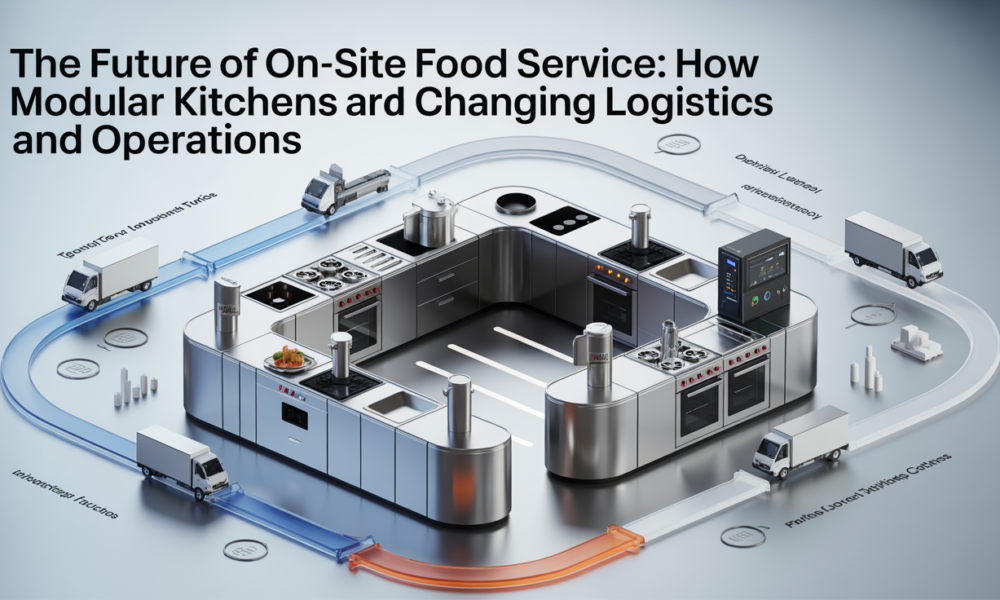The Future of On-Site Food Service: How Modular Kitchens Are Changing Logistics and Operations

Running on-site food service can feel like herding cats, especially when time and space run short. Studies show that modular kitchens can reduce setup time by more than half compared to traditional builds.
This post will explain how prefabricated kitchens help address significant food service challenges, from quick setup to more efficient logistics. Read on for solutions that keep your food operations running more smoothly.
Core Benefits of Modular Kitchens in Food Service
Modular kitchens enhance food service efficiency. They reduce expenses while providing adaptability and simplicity in setup.
Speed to Market
Pop-up events, disaster relief sites, or new construction can serve food fast with prefabricated kitchens. These kitchens arrive ready to plug in and use, slashing setup time from weeks to just a few days.
Event organizers no longer wait around for complicated builds. Contractors see fewer delays and can get employee dining services running before opening day. In emergencies, onsite food production starts right away, meeting urgent needs and raising morale.
With flexible kitchen design and cost-effective construction, teams can stay ahead of schedule instead of struggling to catch up.
Speed matters in the catering industry. Temporary kitchen solutions make it easy to start operations at any site with minimal fuss. Prefabricated kitchens help logistics managers sidestep old headaches like site delays or supply chain hiccups.For a deeper dive into how logistics partners coordinate these fast deployments, you can Learn more about Response Logistics to see real-world examples of modular solutions in action.
Spaces can grow as demand rises or shrink when crowds thin out. This quick start keeps both customers and crews fed without missing a beat.
Cost Efficiency
Disaster teams know budgets can shrink overnight. Modular kitchens slash project costs by up to 40% compared to traditional construction. Prefabricated kitchens quickly cut labor hours, reduce material waste, and dodge expensive site delays.
Event organizers appreciate not paying for empty space; you only pay for what you use, when you need it.
Energy-saving appliances and smart kitchen technology avoid big utility bills in the long run. Contractors and logistics managers save cash since modular setups arrive ready-to-go, sidestepping weeks of brick-and-mortar headaches.
Flexible foodservice units work as temporary or permanent solutions, letting teams grow or shrink operations without a hefty price tag each time plans change. Efficient food production pays off across every meal served—and that efficiency helps set the stage for foolproof design and setup next.
Turnkey Design and Setup
Modular kitchen units arrive preassembled, ready to hook up to utilities. Crew members set up a prefabricated kitchen in less than one week, making fast foodservice possible at disaster sites and large events.
Contractors no longer wrangle with long construction schedules or battle with a maze of permits. Most of the hard work gets handled before the kitchen lands on your site, minimizing downtime and stress.
Every aspect, from equipment placement to ventilation, follows strict health and safety compliance. “Fast setup means teams can focus where it matters—feeding people, not building kitchens.” Smart kitchen technology also arrives pre-installed, letting culinary teams jump into food production quickly.
Save effort, save money, and start moving meals from kitchen to table, fast.
Flexible Layouts for Diverse Needs
Adaptable kitchen designs fit various situations seamlessly. These layouts cater to the needs of disaster teams and event organizers alike. You can adjust them quickly based on space or volume requirements.
In emergencies, a modular kitchen allows swift setup for food service. Contractors appreciate the ease of moving or expanding units without significant renovations.
Different events necessitate distinct workflows. Some spaces require open layouts for high traffic; others benefit from enclosed sections for privacy and efficiency. Whatever the requirement is, these kitchens offer customizable solutions that enhance productivity while ensuring comfort for employees and guests.
This flexibility contributes to effective onsite culinary operations wherever you need it most.
Enhancing Logistics and Operations with Modular Kitchens
Modular kitchens enhance food service logistics by accelerating food preparation and delivery, turning chaos into order in the busiest kitchens. Interested in exploring how else they influence operations? Keep reading!
Streamlined Food Preparation and Delivery
Modular kitchens enhance food preparation and delivery. They simplify the entire process, making it faster and more efficient.
- Prefabricated kitchen designs expedite setup time. This allows teams to focus on cooking rather than construction delays.
- Flexible layouts accommodate various food needs. Chefs can easily rearrange stations for different menus or events.
- Cost-effective solutions reduce expenses in logistics. Lower overhead means teams can allocate funds to other crucial areas.
- Efficient food production practices maximize output. High-demand situations require rapid meal creation without compromising quality.
- Smart kitchen technology helps monitor operations in real time. Managers receive updates and alerts about equipment status, ensuring smooth workflows.
- Simplified supply chain management lowers the risk of shortages. Teams can quickly restock ingredients and keep meals flowing during busy periods.
- Health and safety compliance is built into every design element. Dedicated spaces for cleaning and safe food storage protect team members and customers alike.
- Onsite food production reduces reliance on external suppliers, enhancing both consistency and control over meal quality.
- Employee dining services benefit from quick service setups using modular kitchens, improving morale during long shifts at events or disaster relief operations.
- Sustainable dining options are more achievable with flexible kitchen setups that allow for easy integration of vertical farming practices.
These improvements contribute to an adaptable approach in culinary operations, ensuring teams adjust swiftly to changing demands while delivering exceptional service consistently.
Improved Compliance with Health and Safety Standards
Adopting modular kitchens significantly improves compliance with health and safety standards. These prefabricated setups promote cleanliness and organization. They provide efficient layouts that allow easy access to essential equipment, minimizing contamination risks during food preparation.
Rapid installation times mean teams can set up operations quickly while adhering to strict guidelines. Smart kitchen technology helps monitor conditions such as temperature and humidity in real time, ensuring safe food production thrives on-site.
Organizations can create healthier environments for employees and customers alike through these solutions.
Applications of Modular Kitchens in Modern Food Service
Modular kitchens now play a vital role in various food service applications, from ghost kitchens meeting rising delivery demands to commissary spaces supporting multiple brands. They adapt quickly to changing needs, making them essential for today’s evolving food environment. Interested in how these kitchen solutions are reshaping the culinary scene? Keep reading!
Ghost Kitchens
Ghost kitchens thrive on efficiency and flexibility. They operate solely for delivery, freeing up precious space in traditional restaurant settings. This model suits disaster teams and event organizers seeking quick food solutions during emergencies or big gatherings.
These kitchens can emerge wherever they are needed, ensuring that modular setups adapt to varying demands without the need for a physical restaurant presence.
Catering companies benefit from ghost kitchens too. They allow chefs to focus on culinary innovation while smart kitchen technology helps enhance operations. Costs stay low thanks to less overhead, making it easier for logistics managers to plan food service at events.
With high-quality meals prepared quickly, everyone enjoys delicious options served right at their doorstep.
Commissary Kitchens
Commissary kitchens play an important role in contemporary food service. They provide space for multiple food businesses to operate under one roof. This setup allows staff to work effectively while sharing resources like equipment and storage.
Companies can reduce costs by pooling their resources, which is especially advantageous during events or emergencies.
These modular kitchen designs allow quick adaptation to various needs, whether it’s catering for large gatherings or supporting employee dining services. With advanced kitchen technology integrated into these spaces, the process becomes even more efficient.
Health and safety compliance remains a top priority within commissary kitchens, ensuring that all operations meet industry standards consistently.
Shared Kitchen Spaces
Shared kitchen spaces offer excellent versatility for food service operations. These areas allow multiple businesses to cook from the same facility, optimizing resources and minimizing costs.
They provide a flexible layout that can adapt to various culinary needs. Operators can expand their operations without heavily investing in infrastructure.
Logistics managers benefit from shared kitchens as well. Efficient food production makes it easier to meet demand during events or emergencies. These kitchens also promote sustainable practices by reducing waste through collaboration among users.
Culinary teams can focus on creativity while sharing costs and equipment, making them ideal for disaster response efforts or large-scale gatherings.
Conclusion
Modular kitchens redefine on-site food service. They accelerate operations while reducing costs. Event organizers can assemble them rapidly for any occasion. These kitchens also comply with health standards effortlessly, ensuring safe meals for everyone.
As they become more prevalent, anticipate culinary creativity to increase alongside efficient logistics.




